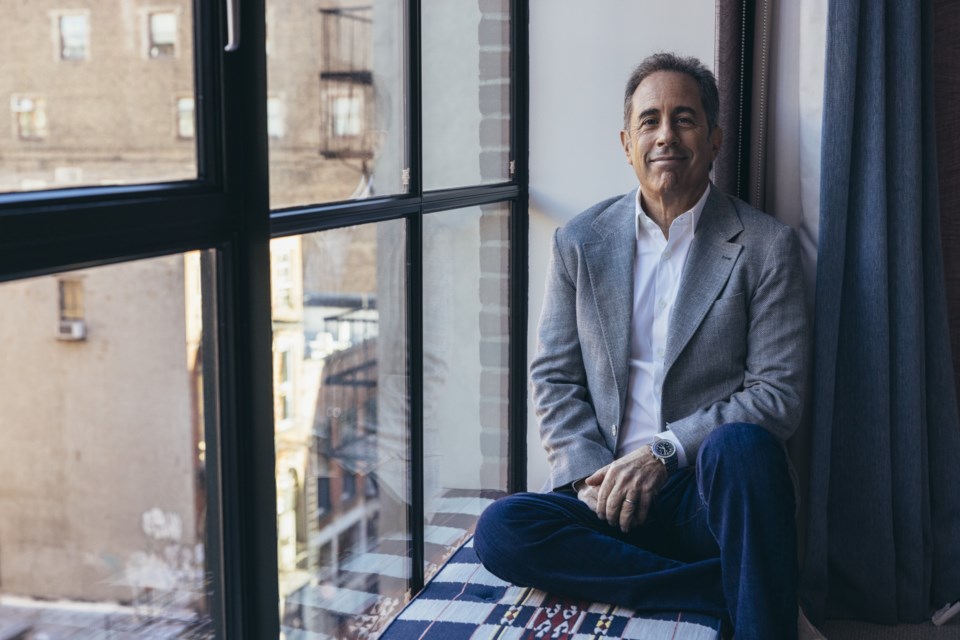NEW YORK (AP) — Jerry Seinfeld has been responsible for more movies than you think.
Yes, he co-wrote and lent his voice to 2007’s “Bee Movie.” But before that, “Seinfeld” — where going to the movies, with or without the aid of Moviefone, was nearly as regular a destination as the coffee shop — gave birth to dozens of (fake) films. “Rochelle, Rochelle.” “Prognosis Negative.” “Sack Lunch.”
But nearly three decades after Seinfeld was, in one episode, cajoled into bootlegging “Death Blow,” he has finally made his first film. Seinfeld directed, co-wrote and stars in “Unfrosted,” a star-studded comedy about the invention of the Pop-Tart premiering May 3 on Netflix.
The film, which co-stars Melissa McCarthy, Jim Gaffigan, Hugh Grant and others, is an outlandish, “Mad Men”-inspired ’60s-set satire in which Kellogg’s and Post Cereal are engaged in a cutthroat race to “upend America’s breakfast table.”
“When you see any scene of it you go, ‘What is that?’ And I was very happy about that,” Seinfeld said in a recent interview. “I like that you look at it and go, ‘I don’t know what this is.’”
For Seinfeld, who has resolutely stuck to stand-up since “Seinfeld” ended in 1998, it’s a rare post-sitcom project, joining a short and sporadic list including the short-lived reality series “The Marriage Ref” and the popular streaming show “Comedians in Cars Getting Coffee.”
“Unfrosted,” though, returns Seinfeld to one of his abiding passions. Remember all those cereal boxes in his apartment on “Seinfeld”? The Pop-Tart is a particular fascination, though. In his 2020 comedy special “23 Hours to Kill,” it formed an extended bit beginning with the childhood memory: “When they invented the Pop-Tart, the back of my head blew right off.”
For Seinfeld, the Pop-Tart has an almost mythical quality. A movie about Oreos or Milk Duds or even Junior Mints wouldn’t work, he says. But the Pop-Tart is different.
“A lot of it is the word. It’s a funny word,” says Seinfeld. “I heard Mattel is trying to do a Hot Wheels movie. That could work. Certain things really got us when we were kids, you know?”
In a wide-ranging interview, Seinfeld discussed subjects large and small.
AP: “Unfrosted” began with an old stand-up bit of yours. Is it surprising to you that you’ve made a movie about it?
SEINFELD: It was all (“Seinfeld” writer) Spike Feresten’s idea. I did not want to do it. I did not think it would work. What’s a movie about inventing the Pop-Tart? That’s not funny. And (“Seinfeld” writer) Andy Robin came up with the idea that it’s “The Right Stuff.” And I went, “Oh, that’s funny.”
AP: You once in an interview suggested you only say you love Pop-Tarts to make the joke work.
SEINFELD: I probably just said that to make that point. But I do love Pop-Tarts. I had one yesterday. We were doing a social media piece with Jimmy Fallon and Meghan Trainor. I took I bite and I went, “This is fantastic.” What I like about it is the man-made quality of it. I love great objects that fit in your hand in a nice way. A pack of cigarettes is one of the greatest things you can put in your hand. It just feels great. Dice feel great. I like a nice spoon. I like things. (Laughs)
AP: You’ve often spoken about your dedication to sharpening and sculpting a joke. Are you still driven by that?
SEINFELD: I started a bit the other night about your kitchen sponge on the sink looking up at you going: “I don’t know how much more you think I have. I was done two months ago.” Now it’s just growing and growing into his monologue of your kitchen sponge telling you, “Let me go! Let me die a rectangle, not in pieces.” When I lock on to something like that, I just want to see how far I can go with it, how long will they let me talk about this.
AP: You’re about to turn 70. Is that meaningful to you?
SEINFELD: No.
AP: Some entertainers turn inward when they reach their 70s, like Steven Spielberg did with “The Fabelmans.” But maybe this is a very personal movie for you.
SEINFELD: Very much. This is my “Fabelmans.” Because I’m not interested in my life. I’m interested in eating.
AP: You’ve said you want to do stand-up into your 80s and beyond.
SEINFELD: To the end. To the very end.
AP: You still feel that way?
SEINFELD: Yeah. The only hard part of my life is the other things. People do ask me about slowing down and I go, “The work part of my life is not stand-up. It’s all the other things.” Stand-up is an incredible, pure experience. Surfing is the great regret of my life that I never really got good at that. I did it for two weeks one time many years ago. But if you were a surfer, you would never stop doing it. That’s what stand-up is for me. Feeling that energy, that natural life-force energy under you and around you, I never get tired of that.
AP: Are you thinking about another stand-up special?
SEINFELD: No, I’m not. ... I envy, sometimes, these little Italian artisans who don’t really care if anybody knows who they are or what they do. And stand-up can be like that. Any writing work is very lonely work. Stand-up, in a way, is kind of a private, lonely world. I’m going to Dayton, Ohio, on Friday. No one’s going to know what happened there. I’m very attracted to that. I’m more attracted to that than, “Hey everyone, I made a movie.”
___
To read an expanded version of this interview, visit: http://apne.ws/ak8QL9l
Jake Coyle, The Associated Press



